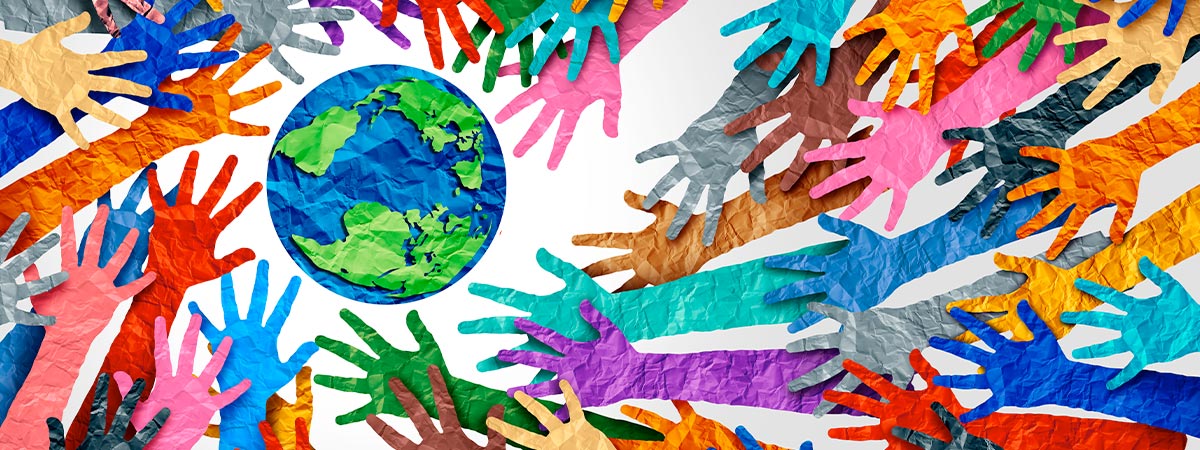Social Initiatives and Sustainable Development


Working towards sustainability
Nebrija University Certificate
Certificate from CIFAL Málaga-UNITAR, United Nations Training Institute

Civil society as a whole participates in the promotion of sustainable development, both in its role as recipient of the benefits derived from it, and as an agent of change and social transformation.
The 2030 Agenda is a global roadmap that aims to transform our world into a more sustainable and inclusive one, leaving no one behind. In this sense, civil society in its various forms of social organization (NGOs, NGDOs, universities, unions, social foundations, etc.) is called upon to play an active role in the implementation of the 2030 Agenda and the SDGs, because social initiatives also have the character of innovation with an impact on prosperity, social development and environmental sustainability.
The range of possibilities for civil society's participation and effective action in sustainable development is increasingly growing. Its dynamism is characterized by networking and its action is materialized in the promotion of projects with an impact on social development, political advocacy, education and awareness for development, among many others.
Social initiatives have the potential to contribute to the achievement of all the SDGs, highlighting among them: SDG-1 (end of poverty), SDG-2 (end hunger), SDG-4 (quality education), SDG-5 (gender equality), SDG-11 (sustainable cities and communities), SDG-12 (sustainable production and consumption), SDG-13 (action to combat climate change) and SDG-17 (global partnership for the achievement of the goals).
Nebrija University offers the Expert Degree in Social Initiatives and the 2030 Agenda with the aim of contributing to the strengthening of the knowledge and skills of civil society actors in sustainable development.
The curriculum is made up of two fundamental modules that address the most relevant aspects of sustainable development and the role of social initiatives in the implementation of the 2030 Agenda and the SDGs.
Objectives
- Study the foundations of sustainable development within the framework of the 2030 Agenda.
- Strengthen the knowledge and capacities of civil society organizations in the implementation of the 2030 Agenda and the SDGs.
- Promote the exchange of experiences and knowledge among civil society actors in social innovation in terms of national and international sustainable development.
- Contribute to the promotion of multi-stakeholder alliances in the implementation of the 2030 Agenda and the SDGs.
Curriculum
Módulo 1.
Sustainable development in the international agenda 6 ECTS
- 3 ECTS | Sustainable Development in the context of development cooperation
- 3 ECTS | Multi-actor partnerships for sustainable development
Módulo 2.
Social initiatives and sustainable development 11 ECTS
- 3 ECTS | Entrepreneurship and social innovation for sustainable development
- 3 ECTS | Education and awareness for sustainable development
- 3 ECTS | Political advocacy for civil society organizations
- 2 ECTS | Case study workshop
Total créditos: 17 ECTS Course Summary
Profesores
 Mayte Serrano
Licenciada en ciencias políticas y
sociología por la Universidad Complutense de Madrid
y Diplomada en procesos y problemas de desarrollo
en América Latina. Cuenta con cerca de 25 años de
experiencia en el sector de cooperación al desarrollo.
Directora de la Coordinadora de Organizaciones para el
Desarrollo de España. Ha trabajado como consultora en
temas de cooperación, ONG y género en los ámbitos de
formulación, seguimiento y evaluación de proyectos y en
acciones formativas.
Mayte Serrano
Licenciada en ciencias políticas y
sociología por la Universidad Complutense de Madrid
y Diplomada en procesos y problemas de desarrollo
en América Latina. Cuenta con cerca de 25 años de
experiencia en el sector de cooperación al desarrollo.
Directora de la Coordinadora de Organizaciones para el
Desarrollo de España. Ha trabajado como consultora en
temas de cooperación, ONG y género en los ámbitos de
formulación, seguimiento y evaluación de proyectos y en
acciones formativas.
 Alejandra Boni
Doctora en Derecho por la Universidad
de Valencia (UPV) en el Programa de Derechos
Humanos y Democracia. Catedrática del Departamento
de Proyectos de Ingeniería de la UPV y Vicedirectora del
Instituto Ingenio (CSIC-UPV). Su investigación y práctica
profesional se centran en educación para el desarrollo,
cooperación internacional, desarrollo humano, innovación
social de base y cambio climático.
Alejandra Boni
Doctora en Derecho por la Universidad
de Valencia (UPV) en el Programa de Derechos
Humanos y Democracia. Catedrática del Departamento
de Proyectos de Ingeniería de la UPV y Vicedirectora del
Instituto Ingenio (CSIC-UPV). Su investigación y práctica
profesional se centran en educación para el desarrollo,
cooperación internacional, desarrollo humano, innovación
social de base y cambio climático.
 Cecilia Carballo
Politóloga, con más de 20 años
de experiencia de trabajo en el ámbito del desarrollo.
Directora de Programas en Greenpeace España y
Vicepresidenta de la Fundación Alianza por la Solidaridad.
Especializada en temas de economía y empleo
verde, políticas públicas y sostenibilidad, cooperación
internacional, responsabilidad social corporativa y medio
ambiente.
Cecilia Carballo
Politóloga, con más de 20 años
de experiencia de trabajo en el ámbito del desarrollo.
Directora de Programas en Greenpeace España y
Vicepresidenta de la Fundación Alianza por la Solidaridad.
Especializada en temas de economía y empleo
verde, políticas públicas y sostenibilidad, cooperación
internacional, responsabilidad social corporativa y medio
ambiente.
 Martha Goyeneche
Periodista. Project manager
del Centro Internacional de Formación de Autoridades y
Líderes (CIFAL Málaga - UNITAR) y directora Ecoestrategia.
com. Es profesora de periodismo y EADE en la
Universidad de Málaga y está especializada en educación
para el desarrollo y ODS.
Martha Goyeneche
Periodista. Project manager
del Centro Internacional de Formación de Autoridades y
Líderes (CIFAL Málaga - UNITAR) y directora Ecoestrategia.
com. Es profesora de periodismo y EADE en la
Universidad de Málaga y está especializada en educación
para el desarrollo y ODS.
 José Antonio Alonso
Catedrático de Economía
de la Universidad Complutense de Madrid. Ha sido
miembro del Committee for Development Policy de
ECOSOC (ONU), del European Advisory Group de la Bill
and Melinda Gates Foundation y del High Level Group of
Wise Persons on the European financial architecture for
development.
José Antonio Alonso
Catedrático de Economía
de la Universidad Complutense de Madrid. Ha sido
miembro del Committee for Development Policy de
ECOSOC (ONU), del European Advisory Group de la Bill
and Melinda Gates Foundation y del High Level Group of
Wise Persons on the European financial architecture for
development.
 Tahina Ojeda Medina
Profesora del Departamento
de Relaciones Internacional de la Universidad Nebrija,
investigadora asociada al Instituto Universitario de Desarrollo
y Cooperación de la Universidad Complutense de
Madrid (IUDC-UCM). Doctora en Ciencias Políticas. Sus
áreas de investigación y consultoría se centran en cooperación
internacional, cooperación sur-sur y triangular,
Agenda 2030 y las políticas de desarrollo sostenible.
Tahina Ojeda Medina
Profesora del Departamento
de Relaciones Internacional de la Universidad Nebrija,
investigadora asociada al Instituto Universitario de Desarrollo
y Cooperación de la Universidad Complutense de
Madrid (IUDC-UCM). Doctora en Ciencias Políticas. Sus
áreas de investigación y consultoría se centran en cooperación
internacional, cooperación sur-sur y triangular,
Agenda 2030 y las políticas de desarrollo sostenible.


